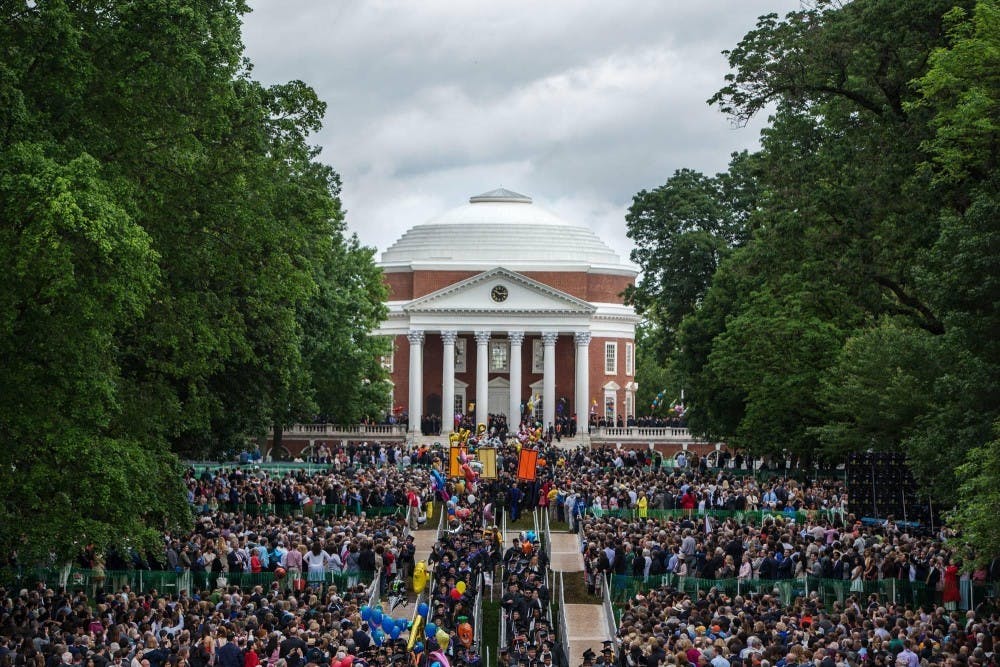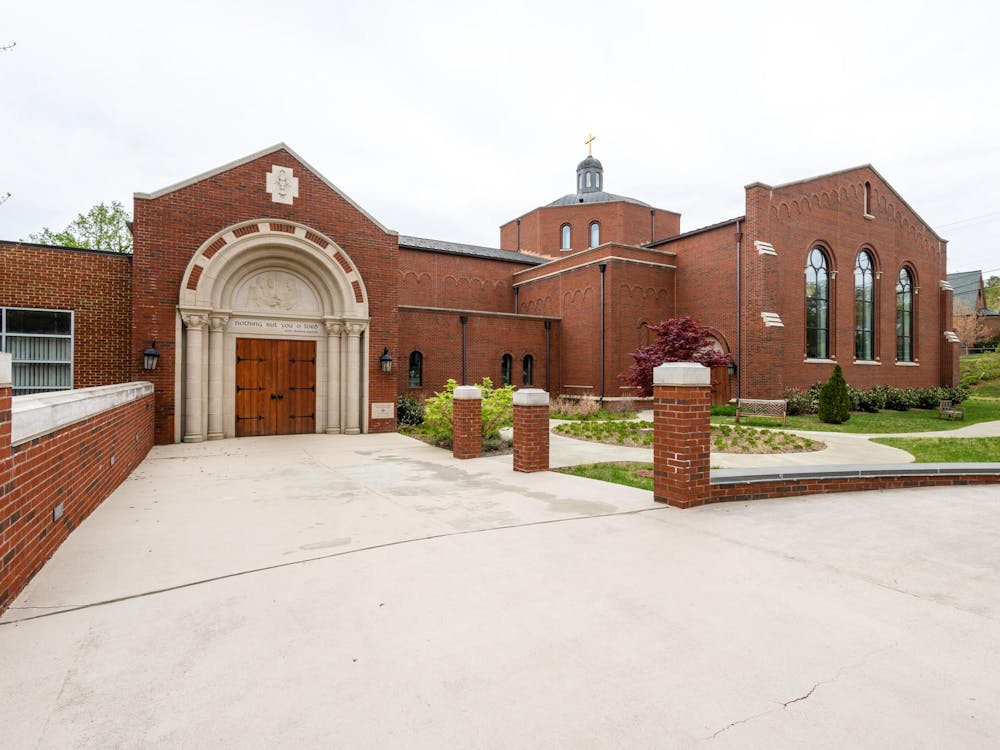All classes will remain online throughout the semester, and Final Exercises will not proceed as planned due to the COVID-19 pandemic, University President Jim Ryan and Provost Liz Magill announced in an email to members of the University community Tuesday night.
This decision came two weeks before the University was expected to determine if classes would return to Grounds and one day after Ryan confirmed that an employee at the Maxine Platzer-Lynn Women’s Center tested positive for COVID-19.
“It is exceedingly unlikely, based on all that we know at this point, that this virus will have abated by the end of April,” Ryan and Magill said in the email. “In light of the need for faculty, staff and students to make plans, we are making the decision now — rather than waiting until April 5 — to not hold any classes on Grounds this semester.”
Ryan and Magill added that “significant, additional steps” were necessary to protect the community from the further spread of the coronavirus.
“We realize and regret that these additional steps will cause more disappointment and call for more sacrifice, but we see no other way to do our part to help confront this public health crisis,” Ryan and Magill said. “At this point, it seems imperative that we do our very best to slow the progression of this virus in order to ‘flatten the curve’ of those infected and avoid overwhelming our health system, which would ultimately risk our patients, our community and our Charlottesville neighbors.”
The announcement followed at least five emails from Ryan and Dean of Students Allen Groves imploring students to return to their homes to mitigate the coronavirus’s impact on the community.
Classes
University professors will primarily use Zoom video and audio conferencing to hold classes remotely through the end of the semester. Some professors will be pre-recording lectures.
Ryan and Magill said the University may take additional steps to ease the transition to long-term online coursework, but did not detail the potential adjustments.
“We are in active discussions about what changes we might make to our normal grading system this semester,” Ryan and Magill said. “We will be back in touch soon once we have made a decision.”
Students have started a petition to offer a pass/fail grading system to ease the shift from face-to-face instruction, arguing that the change puts students at an “educational disadvantage.” The petition has just over 4,000 signatures as of press time. A separate student petition calls for “holistic responses” that include pass/fail options for classes and extensions for assignments during the transition — along with paid sick leave for University employees and wages for student workers who are not eligible for Federal Work Study, a program that provides part-time jobs for students with financial need.
Georgetown University and Northwestern University are offering a pass/fail option in light of similar operational changes. Northwestern, along with Stanford University, also made undergraduates’ final assessments optional.
The University extended the deadline for withdrawing from classes to Thursday and is requiring faculty advisor meetings for fall 2020 enrollment to be held via phone, Skype, Zoom or FaceTime. Course enrollment begins April 6 as planned.
Final Exercises and on-Grounds events
Final Exercises are canceled for the first time since the tradition began in 1829. The graduation ceremony had previously been scheduled for May 16 and 17.
Ryan and Magill said the University made the “difficult decision” to cancel the event as planned “in light of the evidence about the likely progression of the virus over the next couple of months and when it will peak.” Ryan and Magill noted, however, that a team has been working to develop alternatives to Final Exercises. The email did not say when fourth-year students should expect an updated graduation plan.
“We do not make this decision lightly, as we know how disappointing it will be to graduating students and their families,” Ryan and Magill said.
Ryan and Magill also canceled all on-Grounds events until at least May 15, regardless of size, citing the Centers for Disease Control, White House and Commonwealth’s “ever-shrinking size limitations.”
The University’s original size restriction in its previous announcement was for events with more than 100 people. Gov. Ralph Northam mandated gyms, restaurants and theaters reduce their capacities to 10 patrons beginning Tuesday.
The new University restriction applies to all events — even if they are not University-sponsored — that are scheduled to occur on Grounds, including social gatherings.
The only exception will be “small internal meetings, where social distancing should be the touchstone,” according to the email.
Almost all University spaces will be closed to students, including libraries, student activity spaces — like 1515 and Newcomb Hall — gyms and fitness facilities and the Rotunda, which will be closed to the public. Bus services will also be reduced.
Housing and dining
On-Grounds Housing will be further restricted under the new regulations to reinforce social distancing efforts, as only “a very limited number of residents” will be allowed to remain in University Housing, according to the email.
Students must vacate their on-Grounds Housing by Friday unless they are either international students who are unable to return home, students who do not have other homes or students who would be severely risking their health or safety by traveling to their homes. Students who wish to remain in their on-Grounds Housing must submit a request to do so, or they will lose access to their residences.
Ryan and Magill noted that students have until Wednesday at noon to collect their essential belongings from University Housing — and more information will be communicated soon about the University’s move-out schedule.
Undergraduate and graduate students who live off-Grounds are urged to follow the new guidelines for on-Grounds Housing, as well.
In addition, all major dining facilities are closed, effective immediately, with the exception of Observatory Hill Dining Hall. Dining services are limited to takeout and grab-and-go, and students who get their food from O’Hill “will not be able to eat inside the facility.” Students who have their own kitchens are encouraged to prepare their own meals.
Compensation, employment and wages
Pro-rated housing and dining credits will be provided to student accounts for on-Grounds Housing and University dining contracts to offset the changes. Ryan and Magill said additional information about the partial refunds is forthcoming.
“As long as students remain enrolled through the end of the spring semester, financial aid will not be impacted,” Ryan and Magill said.
The email did not mention tuition reimbursement.
Ryan and Magill also announced mandatory telecommuting for all faculty and staff, with the exception of employees who “must report in person to carry out key functions of their units, schools, or UVA Health.” Some employees may be “re-deployed” to “take on tasks elsewhere at the University.” Ryan and Magill expect all adjustments to work plans to be “fully implemented” by the end of the day Friday.
“To be clear, those who must report for work will have to do so,” Ryan and Magill said. “Those who can work remotely will have to do so.”
Professors are permitted to be in their classrooms and offices to teach online and Health System employees are allowed on Grounds to treat patients or support patient services.
The email assured all part-time and full-time employees that their compensation and benefits will remain unchanged “for the foreseeable future.”
“The length of this crisis is difficult to predict at this point, as are the economic ramifications,” Ryan and Magill said. “There may come a point where we need to reassess in light of the length of time of the crisis or significantly changed circumstances, but our hope and plan is to weather this crisis together.”
Ryan and Magill did not make the same assurances to contract workers. An update on their compensation during the University’s closure is forthcoming.
“We have relationships with a wide range of contractors across the University, which present a variety of situations,” Ryan and Magill said. “We are in active conversations with these contractors and hope to be able to provide an update fairly soon.”
Teaching assistants and paid student researchers whose supervisors allow them to continue their work remotely will continue to be paid at the same rates. Students in the Federal Work Study program will be paid an average of their current wages on a bi-weekly basis through the end of the semester.
The email acknowledged that some student workers who are not eligible for Federal Work Study will not be able to work remotely due to the nature of their jobs. These students will not be paid.
“We understand that this will cause some students financial hardship, and we will do whatever we can to help,” Ryan and Magill said. “If you are in need of financial support, please connect with your supervisor, who has received a list of emergency financial resources available to displaced student employees.”
More specific guidance for research on Grounds will be released by midday Wednesday.
The headline of this article has been updated to clarify that Final Exercises have been canceled "as planned."







